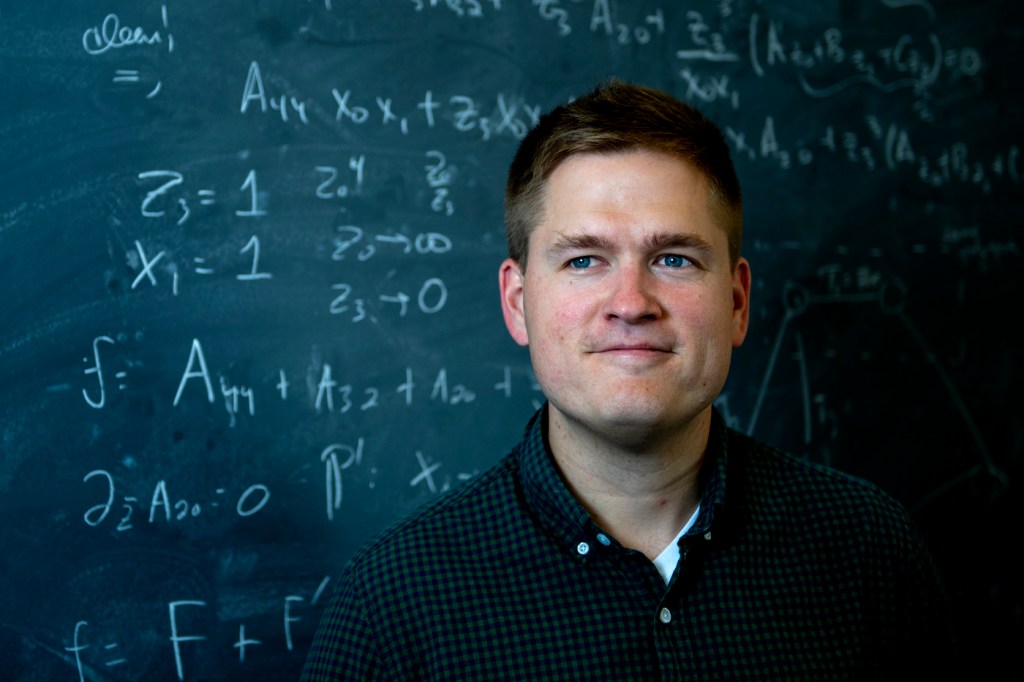Why you need a computer to understand strings and knots

There are strings. And then there are knots.
James Halverson, assistant professor of physics, studies both to ask some of the biggest questions conceivable—what is the universe?—and some of the most banal—can this knot be untangled?
And now he’s doing so with the help of artificial intelligence, a tool not typically used in fields of theoretical physics like his.
Halverson studies string theory, a framework that physicists use to attempt to explain how quantum gravity interacts with elementary particles, the most basic building blocks of matter. Discovering this would fill in a crucial gap in our understanding of the universe.

Brent Nelson is an associate professor and associate dean in the College of Science. Courtesy Photo from Brent Nelson
It’s called “string theory” because the central claim is that these elementary particles aren’t specks of matter at a point in space. Instead, what scientists perceive as particles are actually vibrations in string-like loops.
While string theory is still his primary focus, Halverson says he has also started to branch out to knot theory, a field of study concerned with string-like loops of a different kind.
Knot theory is much more self-explanatory—it’s the mathematical study of a specific kind of knot in which the ends are joined together. An untangled knot, in this case, would be a loop.
Because knots occur frequently in nature, this predominantly theoretical field also has some applications in biology. For example, knowing whether a knot can be untangled is useful for understanding proteins and DNA, which have knot-like patterns.
But whether he’s thinking about literal knots or abstract strings, sometimes knowing which questions to ask can be just as difficult as answering the questions themselves.
That’s where artificial intelligence comes in.
“Some of the problems we face in physics and math are hard to solve, and the right question for cracking open a new problem isn’t always clear,” Halverson says. “AI can change the approach. You tell it the rules of the game, and it can come up with a strategy.”
Artificial intelligence is also helpful for generating data in theoretical physics, since researchers in this field don’t typically conduct experiments.
“I don’t have experimental data,” Halverson says. “But I can have a code that generates as many knots as I’d like. They’re mathematical data represented on a computer even though I’m not constructing those knots in the real world.”
Halverson and Brent Nelson, associate professor of physics, have been selected to help lead the National Science Foundation’s newly established Institute for Artificial Intelligence and Fundamental Interactions along with researchers from Massachusetts Institute of Technology, Harvard University, and Tufts University.
The institute, which will receive $20 million from the National Science Foundation over the next five years, is one of a handful of new institutes designed to further advance the use of artificial intelligence in fields of science that don’t usually use machine learning.
“Things exploded in our area of research three or four years ago,” Nelson says. “We took the opportunity to put Northeastern at the front of that by hosting conferences and networking with people who do this for a living at tech companies.”
Tech companies could actually learn a lot about machine learning from applications in physics, Nelson says.
“The industry uses AI to predict what you’re going to buy. Will you or will you not buy toilet paper? How many cartons of milk are you going to buy?” he says. These questions have definite answers.
But in physics, the problems are continuous, more complex, and can predict much more than just yes or no answers.
For physicists like Halverson and Nelson, the question is: Can we do something more important than predict purchases with these techniques? Things like understanding the evolution of the universe, for example.
For media inquiries, please contact media@northeastern.edu.





